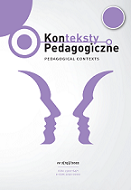Dysleksja a zaburzenia przedsionkowe, proprioceptywne oraz niedojrzałość neuromotoryczna
Dyslexia and vestibular and proprioceptive disorders and neuromotor immaturity
Author(s): Izabella Kucharczyk, Urszula Gosk-SobańskaSubject(s): School education, Educational Psychology, Neuropsychology, Health and medicine and law, Inclusive Education / Inclusion
Published by: Wydawnictwo LIBRON
Keywords: dyslexia; sensory integration; sensory integration disorders; neuromotor immaturity; equivalent reactions; posture control; proprioception; methods of supporting children at risk of dyslexia;
Summary/Abstract: Dyslexia is a specific learning difficulty manifested by an inability to fluently master reading and writing. There are many theories explaining the causes of dyslexia. Among the most recent views is the belief that there is a close connection between the occurrence of specific learning difficulties and sensory integration disorders. The close relationship between reading and writing, and auditory and visual perception, balance skills, postural control, proprioception should be emphasized. Dyslexia can also result from neuromotor immaturity and unrestrained infantile reflexes, such as asymmetric tonic neck reflex, symmetric tonic neck reflex, or tonic vagus reflex. Unrestrained infantile reflexes contribute to, among other things, the inability to cross the midline of the body, difficulties in integrating the right and left and upper and lower sides of the body, and negatively affect visual perception, auditory perception, balance skills, and postural control. The preschool teacher plays an important role in the education process. Based on the child’s symptoms, he or she can select appropriate exercises and therapeutic programs to minimize the effects of neuromotor immaturity, sensory integration disorders, improve psychomotor functions necessary for learning to read and write. The earlier the therapeutic process starts, the more efficiently symptoms of dyslexia can be minimized.
Journal: Konteksty Pedagogiczne
- Issue Year: 19/2022
- Issue No: 2
- Page Range: 11-31
- Page Count: 21
- Language: Polish

